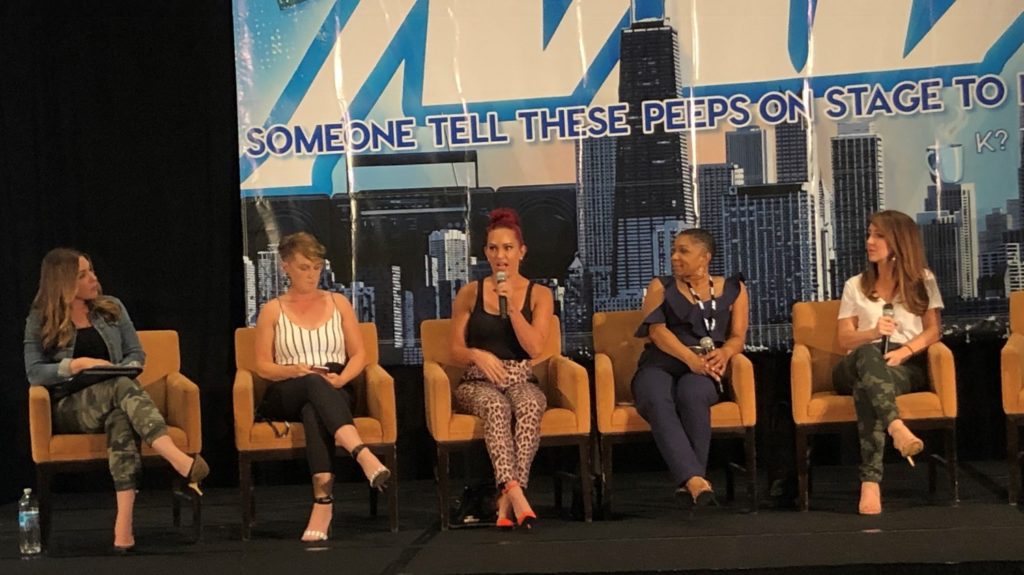
It’s been another interesting chapter in the saga of women in radio. Like every industry, broadcast radio has diversity challenges – and we saw that up close and personal at Morning Show Boot Camp 31 this month in Chicago, as well as in the charts and graphs in AQ2, our talent on talent survey we’ve now conducted for the second consecutive year.
On the surface, the environment appears to be improving for women in radio. But when you start digging a little deeper, you can’t help but encounter some of the same congenital issues. As our AQ study shows, men outnumber women on the air by a 3:1 ratio – same as last year. And that starts an important conversation about the state of the medium, whether it’s in morning radio or even when it comes to voiceover work.
To be sure, some women are hitting it out of the park. Those seeking a shining success story should look no further than the trajectory and 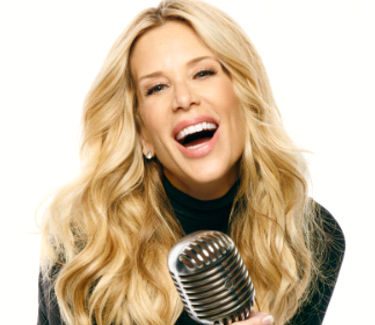 accomplishment of KOST/Los Angeles morning star, Ellen K. As most people in radio know, Ellen was the sidekick for two morning show superstars – Rick Dees and Ryan Seacrest – before striking out on her own.
accomplishment of KOST/Los Angeles morning star, Ellen K. As most people in radio know, Ellen was the sidekick for two morning show superstars – Rick Dees and Ryan Seacrest – before striking out on her own.
While those partnerships were no doubt an important part of Ellen’s learning curve, she sought to go solo in 2015 – and hasn’t looked back.
Like many in radio, Ellen got her start while at college, and interned at WXUS in Lafayette, Indiana. While the beginnings of her career were in a small market, she makes no bones about the need for women to think big – the majors:
“The biggest payday should always be in the biggest markets simply because the ad revenue is so large, but the biggest payday isn’t always the path to happiness. I’ve been happy in the smallest market I’ve worked in because I love the radio business.”
But whether in L.A. or small towns, Ellen K has always relished the personal connection, whether it’s on the studio lines or out in public, connecting with her audience.
Kudos to Ellen for carving out a great career in a tough business. But then there’s the rest of the radio world.
And judging by the “Women’s Forum” at Morning Show Boot Camp, the radio industry has a long way to go.
Led by the solid and steady moderation of Elizabeth Kay (WMYX/Milwaukee mornings), the panel (pictured above) was comprised of outspoken women in radio who discussed how they navigate the many speed bumps they’ve encountered over the years – and today.
And of course, there’s the gap between how men behind the mic think about women’s chances to advance are – and how women approach the same question. As you can clearly see below, they see two very different industries and disparate realities:
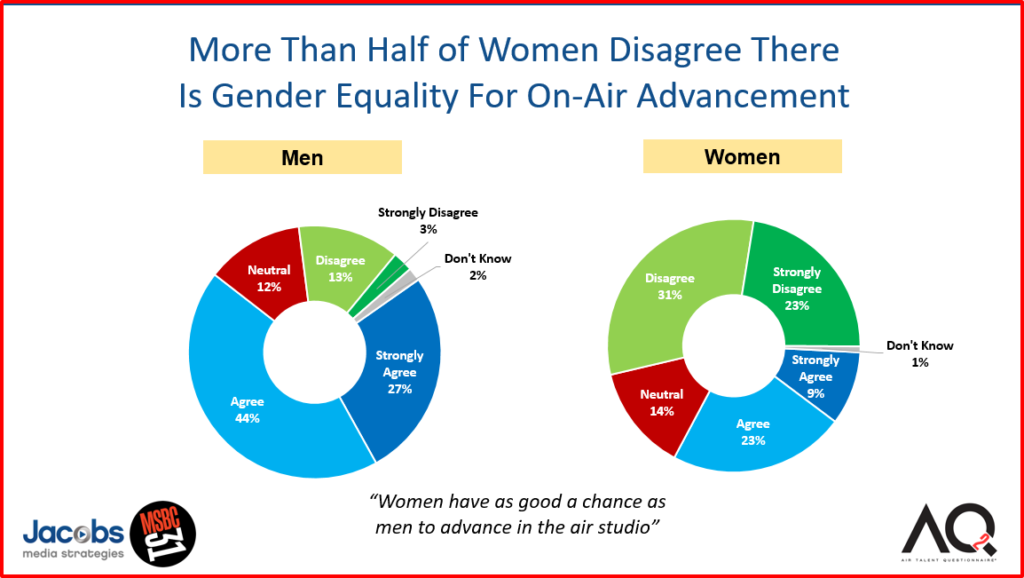
Not surprisingly, that gap we saw in 2018 continues today, underscoring the challenges radio has to provide not just diversity, but opportunity.
Much of the way in which women perceive their chances has to do with support – and where it comes from. In AQ2, we asked the entire sample about where they derive the most support across the spectrum of people, co-workers, and managers in which they have contact. While the answers don’t deviate greatly among the genders, it is clear that women feel their co-hosts and other women at the station are most likely to have their backs.
On the opposite end, they point to upper management, corporate, and sales as least likely to be supportive. That’s not a great set of circumstances.
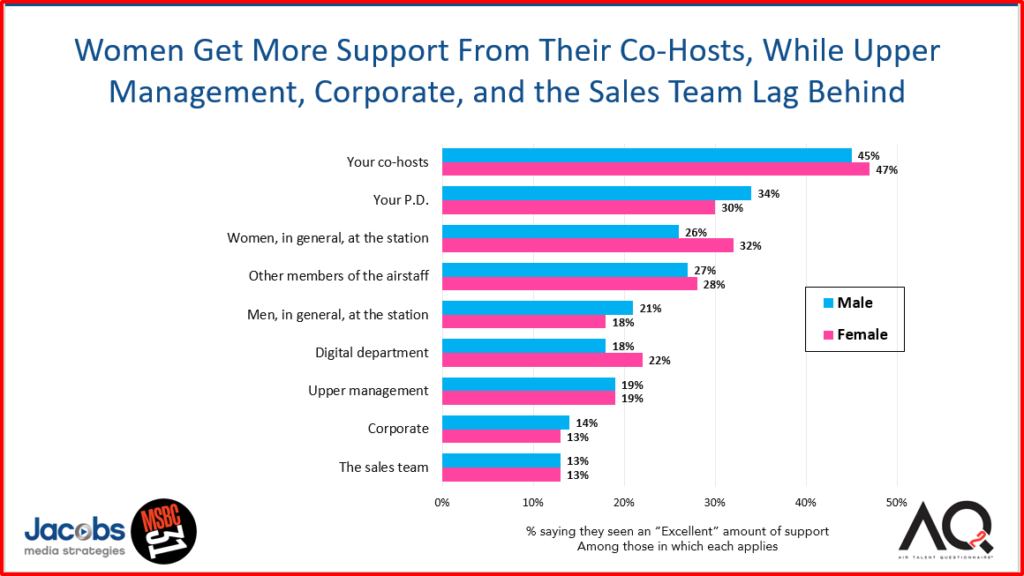
Interestingly, Ellen K provides advice for fledgling broadcasters;
“Find a top seller to give you tips on ways to keep a long-term advertiser or land a new one. Finding creative ways to bring revenue is always a top priority.”
Connecting with revenue and how it is generated came up at Boot Camp, too. As the radio industry struggles to reach its financial goals, women – and all on-air personalities – have a chance to prove their ROI and become even more valuable to the enterprise.
That’s all well and good, but this issue of a lack of support among management may, in fact, be the central theme behind women’s frustration. And while it came through loud in this year’s AQ2 study, it may be one that air personalities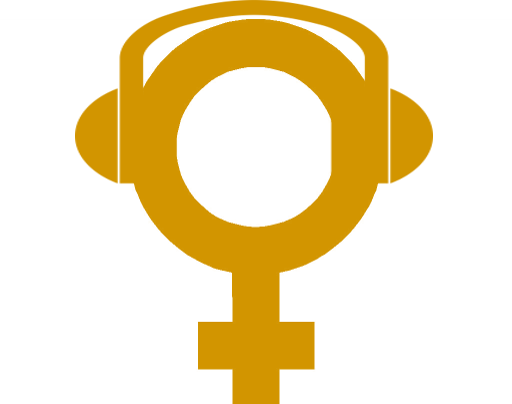 in general – and women specifically – have felt for eons.
in general – and women specifically – have felt for eons.
But at this important junction in the country’s trajectory – and the ways in which people are presented and represented in the media – support needs to come from the entire organization, especially those in influential and power positions.
I felt that sting in my AQ opening session at Morning Show Boot Camp. Elizabeth Kay asked a question about the fate of aging female on-air personalities and whether they have a fair shot at continued success. While I provided a truthful answer, I did so hastily, moving to get to the next questioner and to stay on time.
After having a post-MSBC conversation with Elizabeth, I realize that like so many others in positions of power in radio, I have to be a better listener, especially when it comes to hearing from those who are striving to advance but often are unheard or ignored.
We all do.
- For Radio, Will It Be Christmas In April (And Hopefully, May)? - April 21, 2025
- Media And Technology In 2025: Believe It Or Not! - April 18, 2025
- In Radio, You Just Never Know - April 17, 2025




A lot of people don’t realize that a lot of broadcasting as we know it was invented in Chicago by a woman named Judith Waller who had been moonlighting writing ad copy for a newspaper. I owe my career in music recording to two women who taught radio drama in my Jr and Sr high schools. Both had been producers at NBC in Chicago before most of the women got canned thanks to tax credits offered for hiring WW2 veterans.
https://richsamuels.com/nbcmm/wmaq/waller/waller1.html
Great story, Bob. And Detroiters know that perhaps the most influential music director of all time was a woman – Rosalie Trombley of CKLW. She was so powerful that Bob Seger recorded an ode to her (or was begging for an add) called – of course, “Rosalie.” https://www.youtube.com/watch?v=EsrWwYKxwyE
I read this piece with great interest. As a woman in broadcasting, I’ve come to understand that the higher you wish to go, the more you bump your head against the glass ceiling. Back in the 90’s when I worked in commercial radio for a cluster in Dallas, the highest level female I worked with was the HR director. All of the group VP’s, station managers, program directors and sales managers were white men. Three or four layers down, you might find a female promotions director.
In the last few years, as I became a GM and was eventually replaced by a white male CEO who hired another white male as my counterpart, I have experience a level of gender bias that I’ve never seen before. Last month at a development conference, a white male GM who I have known and respected for decades found it appropriate to give me wardrobe advice for my own conference, telling me what color of dress to avoid. It really is astounding how tone deaf some people are.
Fred, I appreciate you looking in the mirror in this post, but if you look at Jacobs Media’s staff, there is one woman. What does this say about the state of gender equality in our business? Will you walk the walk or just talk the talk?
Abby, this is precisely the problem when you write a daily blog about business practices – you leave yourself open to criticism and self-reflection. Fortunately, you handled that task for me. 🙂
We have two companies – Jacobs Media & jacapps – both sharing the same offices and services.
Regarding Jacobs Media, Lisa Riker is our Business Manager, but when Lori Lewis left the company a few years ago (her choice BTW), we did not replace her.
On the jacapps side of the hall, these four women hold integral positions:
Kate Coyle-Levy — VP, Software Development – Kate is hear head of software development and has been with us for the better part of 9 years (jacapps is 11 years old)
Melissa Webster — Sr. iOS Developer – As the title implies, Melissa is key to our Apple iPhone apps
Chelsea DuFour — Delivery Lead – Chelsea is essentially logistics and client relations, a big, big job when you figure we have 400+ app clients.
Sari Zalesin — Director of Business Development – Sari is head of sales
As you probably know, the tech industry has not done an especially good job with diversity. We have had no trouble finding fantastic employees. And yes, many have been and continue to be women.
On the consulting side, if you can direct any women with a proven track record in programming/consulting major market rock, classic rock, or alternative stations to be, I’d be happy to speak with them when we have an opening.
Thanks for keeping us honest. If’s much easier talking the talk than it is walking the walk. But we do our best to do just that.
Thanks for the clarification, Fred. It certainly is helpful. I will say that, as an industry, we must commit to better professional development opportunities for women. Your point about the tech industry is well taken, but the same point applies across the board. You ask about women with a proven track record on the consulting side, but how do we get that proven track record if we’re not invited onto the track? The same comments are thrown around frequently when we talk about bringing diversity into recruiting and hiring….well, we just don’t have any qualified diverse candidates in the pool. I think we have to make a greater effort to recruit and train for the skills we will need down the line. Thanks again, Fred. You always provide us with excellent food for thought.
Appreciate the dialogue, Abby. This blog becomes more important to our industry conversation the more people join in and express themselves. Thanks for reaching out.